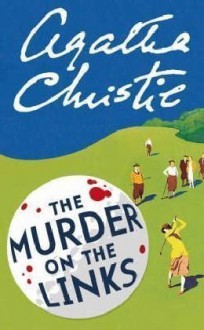
This is Christie's second Poirot mystery, and her third full-length novel. I read it for my chronological re-read of the Christie canon, which will include the short collections in order of publication.
She definitely has not hit her stride in this novel - in my opinion, that really happens with her sixth novel (and fourth Poirot offering) The Murder of Roger Ackroyd. Murder on the Links is a middling Christie - better than some, but not one of her best.
A couple of specific notes - Hastings reappears as Poirot's sidekick. He is introduced in The Mysterious Affair at Styles as Watson to Poirot's Sherlock. Murder on the Links is told from the perspective of Hastings in a first person perspective. I find Hastings nearly intolerable in this book - his preening behavior in attempting to attract the fair "Cinderella" is about as subtle as a male peacock in full mating display. In other words, he acts like a buffoon.
I know, I know, Hastings always acts like a buffoon. But the prosecutor in me nearly swooned when he let his fair lady love - who won't even friggin' tell him her actual name - into the shed where the body, and the murder weapon, are being stored. All I can think about is "chain of custody, chain of custody, chain of custody." Someone should've thrashed him. If the murderer hadn't died before the end of the book, he had compromised the evidence to the point that, even in 1923, prosecution would've been nearly impossible.
And that ending. Oh, dear, that acrobatic, silly ending.
One of the purposes of my reread - besides just sheer fun - is to take a look at Agatha's approach to justice and responsibility in her books, and try to evaluate if it changes or evolves over time. In Styles, the killers were obviously handed over to the authorities, but no mention is made as to their fate. Christie approaches the murder as a puzzle, and much more time is spent on matchmaking between the various existing or potential couples than on mourning the victim. In Links, the murderer receives street justice in self-defense and is killed before the end of the book.
Christie's early books had a romantic streak - couples were constantly falling in love at the drop of a hat. Hastings ultimately marries Cinderella, whose real name is Dulcie, as we learn at the end of the book. That pairing is totally unconvincing, and doesn't seem to age well as the books continue to be written. By the time Hastings disappears completely from the narrative, I am heartily sick of him. I far prefer Ariadne Oliver as Poirot's sidekick, even if most of her books aren't up to the quality of the early Poirots.
TLDR: a second tier Poirot with an annoying sidekick, but still a fun read for Christie fans.

 Log in with Facebook
Log in with Facebook 





